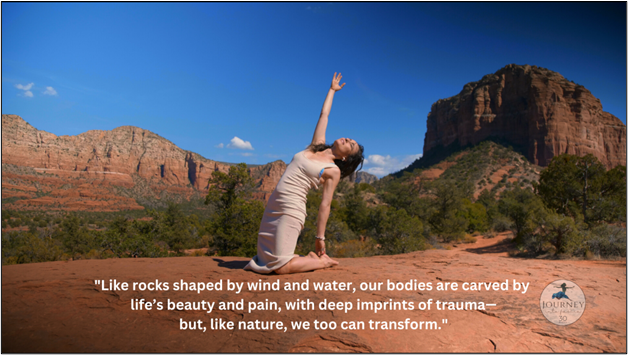
By Magdalena Regdos, RMT
As the sun rises over Sedona’s Red Rocks, a golden glow illuminates the majestic cliffs, their red surfaces shaped by centuries of wind and water. These rocks are a beautiful metaphor for our bodies. Like them, we are sculpted by life’s experiences—the beautiful and the painful. Trauma, whether physical, mental, or emotional, often settles deep within us, creating patterns of tension that shape how we move, think, and feel. Yet, just as nature continually transforms, so too can we.

The Importance of Myofascial Self-Care
At the core of our physical, mental, and emotional well-being is the myofascial complex—a connective tissue web surrounding every muscle, bone, and nerve. Often overlooked, this “unsung hero” is essential to our structure and flexibility, protecting and communicating within our bodies. Fascia is highly responsive to stress, injury, and repetitive movement, and when it becomes restricted, it can lead to discomfort and even chronic pain. But fascia has the capacity to release, akin to rocks that adapt to natural forces, allowing us to rediscover ease and fluid movement.
Myofascial self-care offers a gentle way to release these restrictions, opening the door to greater vitality, pain-free movement, and a balanced body and mind.
How Myofascial Self-Care Helps
By addressing deep restrictions in fascia, John F. Barnes Myofascial Release (MFR) helps restore flexibility, reduce pain, and enhance mobility. This approach not only benefits physical health but also facilitates emotional release, supporting holistic well-being and reconnection with oneself.
Through myofascial self-care, we can release stored tension with simple, guided techniques. Imagine starting each day by identifying areas of tightness and applying gentle pressure to let go of tension. It’s like untying knots in your body, creating a lightness and freedom that elevates your inner balance.
How Myofascial Self-Care Can Elevate Your Health
- Relieving Physical Pain: Targeting fascia helps release chronic pain that may have limited comfort and mobility for years.
- Emotional Release: Releasing fascia often brings emotional lightness, letting go of stress and lifting emotional weight.
- Improved Flexibility and Mobility: Regular practice enhances your range of motion, supporting a more graceful, fluid movement.
- Enhanced Body Awareness: Myofascial self-care deepens your connection with your body and inner “fascial voice,” helping you identify patterns of tension and increase self-awareness.
Explore Your Fascial Voice
Place one hand on your back and another on your belly. Breathe deeply, then soften as you exhale. Clear your mind and ask: What do I want? Let your answers flow naturally, without judgment. Repeat this and let it ground you in your desires. Embracing what you want could be the exact healing you need.

In my Journey into Fascia program, I present you with numerous, profound topics and techniques to release your own fascia and relieve tension from home. This practice goes beyond pain relief, fostering inner calm and strength.
As the holiday season approaches, reconnect with your inner wisdom through exercises like this. You deserve exactly what you desire.
For a deeper dive into myofascial self-care, my book, Journey into Fascia, is an ideal guide. Get your copy here.
Or, join the 30-day virtual journey here. ** Use coupon code: holiday30 for 30% off, valid until Dec 31, 2024.
Let’s unlock your body’s healing potential—the best is yet to come.
Love, Magdalena
Joining The Hub
There are many benefits to joining The Fascia Hub community. We will be continually revising and updating how we can better support our members. Of course, if you have any ideas or thoughts as to what you would like to see, then we would love to hear from you. Our membership proposition is continually evolving and changing to ensure that we bring you the best from the world of fascia. If there is something you would like to learn more about, please do drop us a line and let us know.

